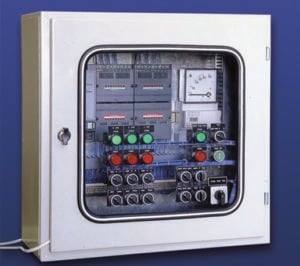June 14, 2021 | Blog
Plastic Machine Guards: Protect Your Team Members
Plastic machine guards create safer production workspaces by shielding your employees from injury caused by moving parts or debris flung from equipment. Cope provides the expertise and durable plastics you need to meet requirements and build a safety-first environment. In almost any manufacturing setting, machinery can present safety challenges both in protecting staff and protecting the machines themselves. A durable barrier strong enough to withstand impact can be crucial to providing necessary protection—especially when that barrier also allows visibility. Transparent plastics are the answer.
If you’re a maintenance engineer, facility supervisor, project engineer, or part of your company safety department working to satisfy OSHA standards or address a recurring safety issue, a plastic machine guard or barrier can be the easiest solution to implement.
Industries That Need Protection
Depending on the setting, protection can come in numerous forms:
- Manufacturing shop floors. Plastic guards separate team members from conveyor belts, and prevent contact that might cause injury to an individual—for example, a guard between clothing or a body part that could otherwise get caught or pulled into the machinery.
- Food processors. Plastic guards that protect the food products they’re processing from contamination by materials outside the production line, as well as contain the food products and byproducts within the line.
- Distribution centers. Shippers and distribution centers employ plastic guards, not only to shield their team members from accidental contact with the material-handling equipment, but also to stop items on those high-speed lines from flying off and injuring team members.
Today, it isn’t just manufacturing and processing environments that require plastic guard structures. Since the 2020 advent of the COVID-19 pandemic, transparent partitions are seemingly everywhere. These barriers have become ubiquitous safeguards in grocery stores, classrooms, dry cleaners, pharmacies, libraries, restaurant pickup counters, banks—almost anywhere people must interact face-to-face but need a barrier to avert virus transmission.


Advantages of Plastic Guards
For preventing potentially dangerous contact, barriers in fixed positions offer the advantage of simplicity in several aspects.
For a start, they’re generally simple to construct and install. The materials are typically easy to cut to shape using standard tools. Similarly, mounting them in place can usually be accomplished just as easily without specialized equipment or hardware. Because of these advantages, your team could potentially construct the barriers on-site, making adjustments quickly and cost-effectively.
Another advantage is maintenance. Plastic guards are made from materials that need minimal care. For example, cleaning requires only a simple wipe-down of surfaces with a mild cleanser.
Lastly, plastic guards ensure an additional layer of safety. Due to the materials used, plastic guards utilized as barriers offer a solid surface to prevent contact, protecting the machine, the products on it, and the team members nearby all at once.

Acrylic Control Panel Guard Replaces Steel Hinge Guard on Conveyor Line
Materials for Plastic Guards
You have a choice in the materials that guards can be constructed from, with several materials readily available, depending on the exact circumstances and your protective barrier needs.
- Polycarbonate—Polycarbonate (PC) plastic is a naturally transparent (light transmission is nearly the same as glass), amorphous thermoplastic with extreme impact resistance. Often used in sheets for plastic machine guards, it’s durable, flexible, and easily machined, and possesses excellent dimensional stability. Polycarbonate sheets bond well using solvent cement or adhesives and can be bent and thermoformed without cracking.
- Acrylic—Commonly referred to as Plexiglas®, acrylic (PMMA) is a transparent plastic that exhibits glass-like qualities such as clarity, brilliance, transparency, and translucency at half the weight of glass. It’s also shatterproof, with up to 10 times the impact resistance of glass. Although it doesn’t handle impact like polycarbonate, it’s much more scratch resistant.
- Clear PVC – Polyvinyl chloride has excellent mechanical properties, impact strength, chemical resistance, and self-extinguishing fire resistance. PVC can be thermoformed, vacuum formed, cold or hot bent, and routed.
- Engineered Plastics (Food & Beverage Industry)—Specific formulations of engineered plastics are FDA, USDA, 3-A Dairy, and NSF compliant, allowing their use in food contact areas. They feature chemical resistance to processed products like citrus while also being resistant to harsh cleaners often required by clean-in-place processes.
- Engineered Plastic (Material Handling Industry)—Durable, low-friction materials, such as nylons, acetals, UHMW and HDPE, help reduce wear and tear, as well as health concerns due to high noise levels.
We’re Standing By to Help You Keep Your Team Safe
It’s even more critical in today’s ever-changing and fast-paced industrial and logistics environments to respond to safety concerns in a proactive, cost-effective way. Cope Plastics guards are relatively simple to fabricate and can solve immediate safety issues without complicated plans, additional regulatory scrutiny, or a lengthy design and prototype period. With one phone call, we may be able to address potentially dangerous safety concerns quickly and easily.
We’re standing by to help protect your team and your machines and increase safety in your production environment. To learn more about Cope Plastics’ solutions for plastic machine guards, contact one of our locations nationwide or easily request a quote online today.
Ready for help with your next project?
Our dedicated team of experts loves helping our customers solve problems and get stuff done. No matter what your vision, we want to help make it happen together!
Let's Talk!